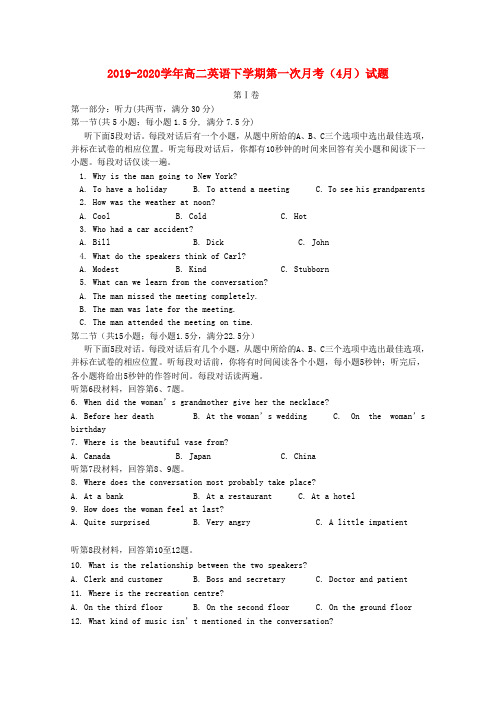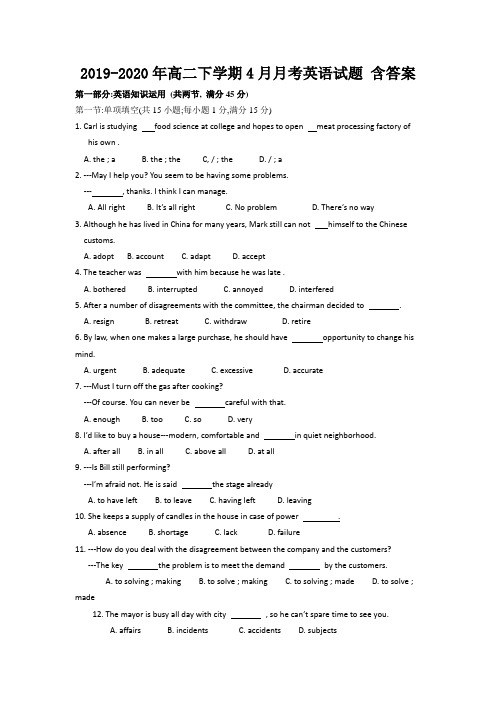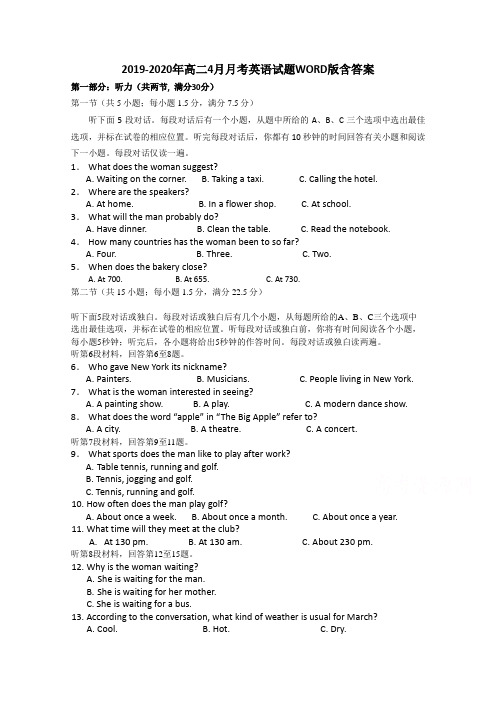福建省永定一中2019-2020学年度下学期高二4月线上考试英语试题(word版)
2019-2020学年高二英语下学期第一次月考(4月)试题.doc

2019-2020学年高二英语下学期第一次月考(4月)试题第Ⅰ卷第一部分:听力(共两节,满分30分)第一节(共5小题;每小题1.5分, 满分7.5分)听下面5段对话。
每段对话后有一个小题,从题中所给的A、B、C三个选项中选出最佳选项,并标在试卷的相应位置。
听完每段对话后,你都有10秒钟的时间来回答有关小题和阅读下一小题。
每段对话仅读一遍。
1. Why is the man going to New York?A. To have a holidayB. To attend a meetingC. To see his grandparents2. How was the weather at noon?A. CoolB. ColdC. Hot3. Who had a car accident?A. BillB. DickC. John4. What do the speakers think of Carl?A. ModestB. KindC. Stubborn5. What can we learn from the conversation?A. The man missed the meeting completely.B. The man was late for the meeting.C. The man attended the meeting on time.第二节(共15小题;每小题1.5分,满分22.5分)听下面5段对话。
每段对话后有几个小题,从题中所给的A、B、C三个选项中选出最佳选项,并标在试卷的相应位置。
听每段对话前,你将有时间阅读各个小题,每小题5秒钟;听完后,各小题将给出5秒钟的作答时间。
每段对话读两遍。
听第6段材料,回答第6、7题。
6. When did the woman’s grandmother give her the necklace?A. Before her deathB. At the woman’s weddingC. On the woman’s birthday7. Where is the beautiful vase from?A. CanadaB. JapanC. China听第7段材料,回答第8、9题。
2019-2020年高二下学期4月月考英语试题 含答案

2019-2020年高二下学期4月月考英语试题含答案第一部分:英语知识运用(共两节, 满分45分)第一节:单项填空(共15小题;每小题1分,满分15分)1. Carl is studying food science at college and hopes to open meat processing factory ofhis own .A. the ; aB. the ; the C, / ; the D. / ; a2. ---May I help you? You seem to be having some problems.--- , thanks. I think I can manage.A. All rightB. It’s all rightC. No problemD. There’s no way3. Although he has lived in China for many years, Mark still can not himself to the Chinese customs.A. adoptB. accountC. adaptD. accept4. The teacher was with him because he was late .A. botheredB. interruptedC. annoyedD. interfered5. After a number of disagreements with the committee, the chairman decided to .A. resignB. retreatC. withdrawD. retire6. By law, when one makes a large purchase, he should have opportunity to change his mind.A. urgentB. adequateC. excessiveD. accurate7. ---Must I turn off the gas after cooking?---Of course. You can never be careful with that.A. enoughB. tooC. soD. very8. I’d like to buy a house---modern, comfortable and in quiet neighborhood.A. after allB. in allC. above allD. at all9. ---Is Bill still performing?---I’m afraid not. He is said the stage alreadyA. to have leftB. to leaveC. having leftD. leaving10. She keeps a supply of candles in the house in case of power .A. absenceB. shortageC. lackD. failure11. ---How do you deal with the disagreement between the company and the customers?---The key the problem is to meet the demand by the customers.A. to solving ; makingB. to solve ; makingC. to solving ; madeD. to solve ; made12. The mayor is busy all day with city , so he can’t spare time to see you.A. affairsB. incidentsC. accidentsD. subjects13. I try to 20 minutes each day to take some exercise.A. set apartB. set aboutC. set downD. set aside14. Children are to meet with setbacks ( 挫折) as they grow up, so their parentsdon’t have to worry about it.A. possibleB. dueC. necessaryD. bound15. At the foot of the mountain .A. a village liesB. lies a villageC. does a village lieD. lying a village第二节:完形填空(共20小题;每小题1.5分,满分30分)。
2019-2020学年福建省龙岩市永定县城关中学高二英语月考试卷含解析

2019-2020学年福建省龙岩市永定县城关中学高二英语月考试卷含解析一、选择题1. The two presidents agree with each other on the whole, but much remains ______ at the following meeting.A. to discussB. discussingC. to be discussedD. discussed参考答案:C2. _____ for breaking the window, the boy cried for he hadn’t done it.A. To be blamedB. BlamedC. Having blamedD. Blaming参考答案:B3. For Japanese, ____ year is too short to lessen ____ pain and suffering of the nuclear disaster.A. the; 不填B. a; 不填C. a; theD. the; a参考答案:C略4. Climbing mountains was _________ , so we all felt _________ .A. tiring; tiredB. tired; tiringC. tiring; tiringD. tired; tired参考答案:A略5. --- My teacher says she’s canceling the class play. I just can’t understand.--- _____. You were looking forward to it.A. It doesn’t matter. C. It’s very unwise of her.C. Don’t worry about it.D. You must be disappointed.参考答案:D略6. “Never teach a child anything ______ you are not sure yourself”, said the expert to the parents.A. thatB. whatC. of whichD. which参考答案:C【详解】考查定语从句。
2019-2020年高二4月月考英语试题WORD版含答案

2019-2020年高二4月月考英语试题WORD版含答案第一部分:听力(共两节, 满分30分)第一节(共5小题;每小题1.5分,满分7.5分)听下面5段对话。
每段对话后有一个小题,从题中所给的A、B、C三个选项中选出最佳选项,并标在试卷的相应位置。
听完每段对话后,你都有10秒钟的时间回答有关小题和阅读下一小题。
每段对话仅读一遍。
1.What does the woman suggest?A. Waiting on the corner.B. Taking a taxi.C. Calling the hotel. 2.Where are the speakers?A. At home.B. In a flower shop.C. At school.3.What will the man probably do?A. Have dinner.B. Clean the table.C. Read the notebook. 4.How many countries has the woman been to so far?A. Four.B. Three.C. Two.5.When does the bakery close?A. At 700.B. At 655.C. At 730.第二节(共15小题;每小题1.5分,满分22.5分)听下面5段对话或独白。
每段对话或独白后有几个小题,从每题所给的A、B、C三个选项中选出最佳选项,并标在试卷的相应位置。
听每段对话或独白前,你将有时间阅读各个小题,每小题5秒钟;听完后,各小题将给出5秒钟的作答时间。
每段对话或独白读两遍。
听第6段材料,回答第6至8题。
6.Who gave New York its nickname?A. Painters.B. Musicians.C. People living in New York. 7.What is the woman interested in seeing?A. A painting show.B. A play.C. A modern dance show. 8.What does the word “apple” in “The Big Apple” refer to?A. A city.B. A theatre.C. A concert.听第7段材料,回答第9至11题。
2019-2020学年高二英语下学期第一次(4月)月考试题.doc

2019-2020学年高二英语下学期第一次(4月)月考试题第一卷(选择题共100分)第一部分听力(共两节,满分30分)第一节(共5小题;每小题1.5分,满分7.5分)听下面5段对话。
每段对话后有一个小题,从题中所给的A、B、C三个选项中选出最佳选项,并标在试卷的相应位置。
听完每段对话后,你都有10秒钟的时间来回答有关小题和阅读下一小题。
每段对话仅读一遍。
1. How will the girl’s mother pay for the CD?A. In cash.B. By cheque.C. By credit card.2. What will the speakers do in the afternoon?A. Build a tree house.B. Go mountain biking.C. Play beach volleyball.3. What does the woman ask the man to do?A. Drive a car.B. Move some boxes.C. Make a phone call.4. What are the speakers discussing?A. When to watch TV.B. Whether to watch a film.C. What programme to watch.5. Why is the woman disappointed about the restaurant?A. The price is unacceptable.B. The waiter is unfriendly.C. The service is slow.第二节(共15小题;每小题1.5分,满分22.5分)听下面5段对话或独白。
每段对话或独白后有几个小题,从题中所给的A、B、C三个选项中选出最佳选项,并标在试卷的相应位置。
听每段对话或独白前,你将有时间阅读各个小题,每小题5秒钟;听完后,各小题将给出5秒钟的作答时间。
- 1、下载文档前请自行甄别文档内容的完整性,平台不提供额外的编辑、内容补充、找答案等附加服务。
- 2、"仅部分预览"的文档,不可在线预览部分如存在完整性等问题,可反馈申请退款(可完整预览的文档不适用该条件!)。
- 3、如文档侵犯您的权益,请联系客服反馈,我们会尽快为您处理(人工客服工作时间:9:00-18:30)。
永定一中2019-2020学年度下学期高二4月线上考试英语试题满分150分时间120分钟第一部分听力(共两节, 满分30分)第一节(共5小题; 每小题1. 5分, 满分7. 5分)听下面5段对话。
每段对话后有一个小题, 从题中所给的A、B、C三个选项中选出最佳选项, 并标在试卷的相应位置。
听完每段对话后, 你都有10秒钟的时间来回答有关小题和阅读下一小题。
每段对话仅读一遍。
1. What can we know about the sports centre?A. It is under construction.B. It is very famous in the world.C. It is the most modern one in the country.2. Why does the woman want to get the blue coat?A. Because she prefers the color.B. Because the price is reasonable.C. Because it is on sale now.3. What musical instrument does the woman play the most?A. The violin.B. The flute.C. The guitar.4. What do we learn from the conversation?A. It rained heavily today.B. The man had a cold today.C. Many animals were on the street today.5. What was Sally doing?A. Lending money to a student.B. Asking for financial aid.C. Reading students’applications.第二节(共15小题; 每小题1. 5分, 满分22. 5分)听下面5段对话。
每段对话后有几个小题, 从题中所给的A、B、C三个选项中选出最佳选项, 并标在试卷的相应位置。
听每段对话前, 你将有时间阅读各个小题, 每小题5秒钟; 听完后, 各小题给出5秒钟的作答时间。
每段对话读两遍。
听第6段材料, 回答第6、7题。
6. What does the man think of most plays?A. They are terribly written.B. They are too expensive.C. They are hard to understand.7. Where do the two speakers finally decide to go?A. To a concert.B. To the library.C. To the theatre.听第7段材料, 回答第8、9题。
8. What’s wrong with the woman’s father?A. He has caught a bad cold.B. He is seriously injured.C. He is in the hospital.9. What does the man think of Mary’s father?A. He is a healthy man.B. He doesn’t smoke at all.C. He smokes a great deal.听第8段材料, 回答第10~12题。
10. Where does the conversation probably take place?A. In the library.B. In a quiet place.C. In a classroom.11. Why does Mike often get angry?A. The man often brings guests over to the house.B. He wants to live alone.C. He hasn’t enough money.12. What does the woman suggest?A. The man should fight with Mike.B. The man should have a friendly talk with Mike.C. The man should move out.听第9段材料, 回答第13~16题。
13. What are the speakers going to do tonight?A. See a movie.B. Have a meeting.C. Attend a party.14. What kind of food does the woman prefer?A. Chinese food.B. Mexican food.C. American food.15. How are the speakers going there?A. By bus.B. By bike.C. By subway.16. What do we know about Tina?A. She lives in the city.B. She is a humorous and nice girl.C. She and the woman went to the same school.听第10段材料, 回答第17~20题。
17. What does Mr Henry Stone do?A. A bank clerk.B. A teacher.C. A writer.18. What does Henry like doing at airports?A. Watching people.B. Telling stories.C. Reading magazines.19. What did Henry learn from the newspaper that day?A. A valuable suitcase was missing.B. A man stole money from a bank.C. A woman ran away from home.20. Why was the woman at the airport?A. She was traveling on business.B. She was seeing the man off.C. She was leaving for Greece.第二部分:阅读理解(共两节,满分40分)第一节(共15小题;每小题2分,满分30分)阅读下列短文,从每题所给的四个选项(A、B、C和D)中,选出最佳选项,并在答题卡上将该项涂黑。
ARanulph Fiennes,explorerWhen I was 10,I wanted to buy a canoe (独木舟)and needed £85.I washed the buses at Midhurst bus station between 3 am to 7 am during the week.Then I washed the dishes at the Angel Hotel from 6 pm to 10 pm.I was paid £11 per week in all,and that’s how I got the cash.It is too long ago to know if I actually learnt anything from the experience.Russel Kane,comedianI did two humiliating (不体面的) Saturday jobs.The first was selling vacuum cleaners door to door.I didn’t sell a single one.The other job was working with my granddad for a frozen-food delivery service.I doubt whether/if a Saturday job really teaches you anything.Where I come from,it’s automatic: at age 11 you get a job.It wasn’t,“Hey,man.I’m really learning the value of work.” It was,“If I want money,I must work for it.” My dad never gave me a penny of pocket money after the age of 11.Tony Ross,illustrator and authorIn the fifties,when I was a boy,I used to work at the Post Office over Christmas.Many of us did it,and it was fantastic fun.I earned enough to buy an old motor cycle.I learnt the basics of working for money like arriving on time,and enjoying it no matter what.It was a good introduction because very few people work for fun.Adele Parks,authorWhen I was 16,I worked in our local supermarket,stacking (堆放) shelves for two years.I am good at talking and telling stories,and I think I learnt it there,because one of the things about stacking shelves or being at the checkout is that you get to pass the time with people.That’s what I liked best.21.To get his dream canoe,what did Ranulph Fiennes do when he was ten?A.He worked very hard.B.He asked his dad for help.C.He was absent from school.D.He borrowed £74 from others.22.Why did Russel Kane take part-time jobs at age 11?A.To buy a gift for himself.B.To earn his pocket money.C.To get some work experience.D.To follow his granddad’s example.23.Who probably dealt with mail in his or her part-time job?A.Ranulph Fiennes.B.Russel Kane.C.Tony Ross.D.Adele Parks.24.How does Adele Parks feel about her job in the local supermarket at age 16?A.Grateful.B.Ashamed.C.Regretful.D.Disappointed.BArriving in Sydney on his own from India, my husband, Rashid, stayed in a hotel for a short time while looking for a house for me and our children.During the first week of his stay, he went out one day to do some shopping. He came back in the late afternoon to discover that his suitcase was gone. He was extremely worried as the suitcase had all his important papers, including his passport.He reported the case to the police and then sat there, lost and lonely in a strange city, thinking of the terrible troubles of getting all the paperwork organized again from a distant country while trying to settle down in a new one.Late in the evening, the phone rang. It was a stranger. He was trying to pronounce my husband's name and was asking him a lot of questions. Then he said they had found a pile of papers in their trash can that had been left out on the footpath.My husband rushed to their home to find a kind family holding all his papers and documents. Their young daughter had gone to the trash can and found a pile of unfamiliar papers. Her parents had carefully sorted them out, although they had found mainly foreign addresses on most of the documents. At last they had seen a half-written letter in the pile in which my husband had given his new telephone number to a friend.That family not only restored the important documents to us that day but also restored our faith and trust in people. We still remember their kindness and often send a warm wish their way.25.What did Rashid plan to do after his arrival in Sydney?A. Go shopping.B. Find a house.C. Join his family.D. Take a vacation.26. The girl’s parents got Rashid’s phone number from_______.A. a friend of his familyB. a Sydney policemanC. a letter in his papersD. a stranger in Sydney27. What does the underlined word “restored”in the last paragraph mean?A. Showed.B. Sent out.C. Delivered.D. Gave back.28. Which of the following can be the best title for the text?A. From India to AustraliaB. Living in a New CountryC. Turning Trash to TreasureD. In Search of New FriendsBWhether in the home or the workplace, social robots are going to become a lot more common in the next few years. Social robots are about to bring technology to the everyday world in a more humanized way, said Cynthia Breazeal, chief scientist at the robot company Jibo.While household robots today do the normal housework, social robots will be much more like companions than mere tools. For example, these robots will be able to distinguish when someone is happy or sad. This allows them to respond more appropriately to the user. The Jibo robot, arranged to ship later this year, is designed to be a personalized assistant. You can talk to the robot, ask it questions, and make requests for it to perform different tasks. The robot doesn’t just deliver general answers to questions; it responds based on what it learns about each individual in the household. It can do things such as reminding an elderly family member to take medicine or taking family photos.Social robots are not just finding their way into the home. They have potential applications in everything from education to health care and are already finding their way into some of these spaces.Fellow Robots is one company bringing social robots to the market. The company’s “Oshbot”robot is built to assist customers in a store, which can help the customers find items and help guide them to the product’s location in the store. It can also speak different languages and make recommendations for different items based on what the customer is shopping for.The more interaction the robot has with humans, the more it learns. But Oshbot, like other social robots, is not intended to replace workers, but to work alongside other employees. “We have technologies to train social robots to do things not for us, but with us,”said Breazeal.31.How are social robots different from household robots?A. They can control their emotions.B. They are more like humans.C. They do the normal housework.D. They respond to users more slowly.30.. What can a Jibo robot do according to Paragraph 3?A. Communicate with you and perform operations.B. Answer your questions and make requests.C. Take your family pictures and deliver milk.D. Obey your orders and remind you to take pills.31. What does the passage mainly present?A. A new design idea of household robots.B. Marketing strategies for social robots.C. Information on household robots.D. An introduction to social robots.CYou are given many opportunities in life to choose to be a victim or a creator. When you choose to be a victim, the world is a cold and difficult place. “They”did things to you which caused all of your pain and suffering. “They”are wrong and bad, and life is terrible as long as “they”are around. Or you may blame yourself for all your problems, thus internalizing(内化) your victimization. The truth is, your life is likely to stay that way as long as you feel a need to blame yourself or others.Those who choose to be creators look at life quite differently. They know there are individuals who might like to control their lives, but they don’t let this get in the way. They know they have their weaknesses, yet they don’t blame themselves when they fail. Whatever happens, they have choice in the matter. They believe their dance with each sacred(神圣的) moment of life is a gift and that storms are a natural part of life which can bring the rain needed for emotional and spiritual growth.Victims and creators live in the same physical world and deal with many of the same physical realities, yet their experience of life is worlds apart. Victims relish (沉溺) in anger, guilt, and other emotions that cause others—and even themselves—to feel like victims, too. Creators consciously choose love, inspiration, and other qualities which inspire not only themselves, but all around them. Both victims and creators always have choice to determine the direction of their lives.In reality, all of us play the victim or the creator at various points in our lives. One person, on losing a job or a special relationship, may feel as if it is the end of the world and sink into terrible suffering for months, years, or even a lifetime. Another with the same experience may choose to first experience the grief, then accept the loss and soon move on to be a powerful creative force in his life. In every moment and every circumstance, you can choose to have a fuller, richer life by setting a clear intention to transform the victim within, and by inviting into your life the powerful creator that you are.32.What does the word “they”in Paragraph 1 probably refer to?A. People and things around you.B. Opportunities and problems.C. Creators and their choices.D. Victims and their sufferings.33. According to Paragraph 2, creators __________.A. seem willing to experience failures in lifeB. possess the ability to predict future lifeC. handle ups and downs of life wiselyD. have potential to create something new34. The examples mentioned in Paragraph 4 show that __________.A. strong attachment to (沉浸在) sufferings in life pulls people into victimsB. people need family support to deal with challengers in lifeC. it takes creators quite a long time to get rid of their painsD. one’s experiences determine his attitude toward life35. What is the author’s purpose in writing this passage?A. To define victims and creators.B. To evaluate victims against creators.C. To explain the relationship between victims and creators.D. To suggest the transformation from victims to creators.第二节(共5小题;每小题2分,满分10分)根据短文内容,从短文后的选项中选出能填入空白处的最佳选项,选项中有两项为多余选项。
